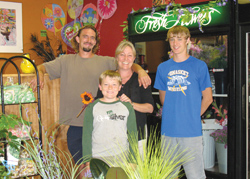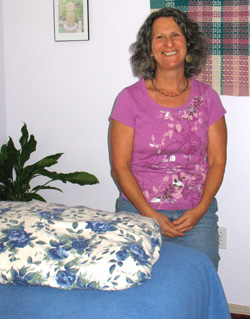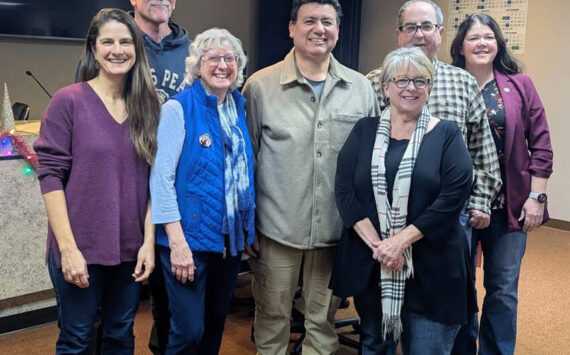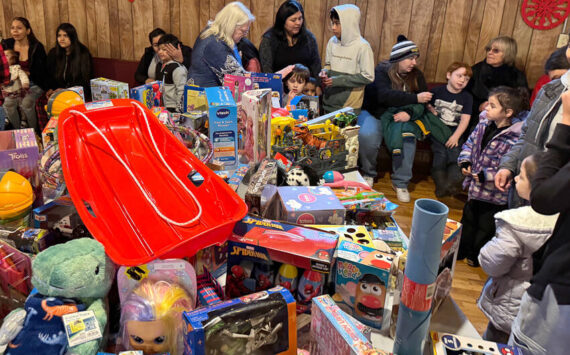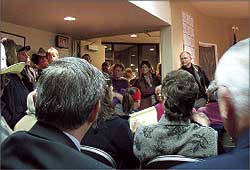
Architect Dave Frunkland, from Yakima, talked about the proposed North Valley Hospital renovations at length with a packed crowd Nov. 27. Most of the council meeting was spent on the proposed plans, addressing a sometimes-hostile crowd – Photo by Amy Vene
A standing-room-only crowd greeted Nov. 27’s city council meeting, eager to voice their opinions, whether supportive or objective, to the North Valley Hospital’s proposed expansion plans.
Though the hospital asked for a delay in the decision to vacate 2nd Street, the council still allowed public comment. The new meeting was scheduled for Jan. 22, 2008.
Architect Dave Frunklund explained the options in design, which would either remove the back of the Whitestone Apartments or the Tonasket Eagle’s Property.
The expansion was necessary, Frunkland said.
Tonasket is in need of a larger facility and the various parts of the hospital cannot be divided, Frunkland said.
“Right now, it’s designed as one entity; if we divide the parts, it becomes more inefficient and difficult for doctors and nurses. You kill the parts if you separate them,” Frunkland said.
It would also be too expensive to move the hospital, he said. “Moving the facility is way beyond the range of this community. You need to do something to update this facility.”
No matter what plan the hospital pursued, expansion is necessary, Frunkland said.
“The only way to expand the hospital is to cross the street. There’s no room on-site, so we obviously can’t expand there. The vacation of 2nd Street is a necessity,” he said. There was also no way to expand the hospital without acquiring some property, he said.
“Can we do the expansion without acquiring property? No, we cannot. There’s not enough parking without taking some property. And we have to have parking, especially during construction.”
The hospital has three options to expand, Frunkland said. All include vacating 2nd Street.
The first is to buy the Whitestone Apartments, forcing the businesses there to move. While that plan is cost-effective for the community, Frunkland said it is not ideal.
Removing the building and those businesses was a serious concern and would be detrimental to the community, he said. It would hinder Tonasket’s “Main Street image,” he said.
“You have a beautiful little town and you’re right that taking away these main street businesses would detract from it.”
The second option – the most inadequate, Frunkland said – was to purchase the north 18 feet of the Eagle’s property. This had several inherent flaws, he said, including the location of patient rooms and splitting various parts of the hospital. Though that plan added parking, it still lacked adequate space, he said.
The final option, called the best by hospital staff and Frunkland, has the hospital expand over the Eagle’s property. Frunkland said the third plan provided the best design, adequate parking and the least infraction on the town.
However, the catch: In the third design, the Eagles would lose their location.
Washington State Eagles president-elect Denis Allen traveled from Spokane to address the issue.
“The Eagles are not against this hospital expansion,” Allen said. “Eagles nationwide support hospitals and have donated more then $10 million to hospitals for research. In the last year, the state of Washington Eagles Association has donated $220,000 to hospitals,” he said.
Regardless of their hospital support, he had concerns about the proposed expansion.
“We’re not here to argue about the need for a hospital here,” Allen said. “But the Tonasket Eagles are here and they’re not going away. You need them. You need some amicable agreement so the Eagles can co-exist in the city of Tonasket.”
In a recent press release, the Eagles announced the formation of a six-person committee to work with the hospital to attempt to find a compromise. The six members are Dave Kester, Mike Kessler, Arnie Marchland, Ken Montanye, Bob Pardue and Brad Wood.
Hospital administrator Warner Bartleson said he was pleased with the committee and that he believes they will be able to work together and the delay would help them.
“We hope to be able to do this with the Eagles,” he said. “They have put together, I’m pleased to say, a very knowledgeable committee who can put down what the Eagle’s needs are, we can say what our needs are and search for ways to meet those needs.”
Chris Branch, the Tonasket Planning Development Coordinator, recommended the city council postpone a decision until further data was collected. The planning committee was not willing to grant approval of vacating the street without a certain final outcome.
“It can sound like a good idea, but we need to know the final outcome before moving ahead,” he said.
But that delay and possible compromise did not smooth the full council room.
One man, who did not give his name before speaking, said to the council, “Anyone who votes for this levy will not be reelected.”
Jack Rawley, the local Eagle’s secretary, said, “I can guarantee that if you don’t come to an agreement and take our property by imminent domain, you won’t pass another levy in this town for 50 years.”
Some people at the meeting were more direct.
A woman who identified herself as Pat Nelson told the hospital board and administrator, “You people are bald-faced lying to us, you’re making crap up! Why don’t we vote again?” Many people agreed, verbally and by clapping.
Some locals supported the hospital.
“People, we’re all in a sundry over this,” said Duane Rawley. “This isn’t Exxon-Mobile or big business who are going to come in here and gain wealth. The people who benefit from a hospital are all of us. The hospital is not the all-conquering corporation looking to gain wealth. A hospital is a public utility we all need. Yes, something does need to be done, but tonight I haven’t heard the hospital talk about or threaten imminent domain. The only people who’ve been saying it are you!”
Despite the arguments, taking the hospital out of Tonasket was not an option, when Hospital Commissioner Dick Larson proposed it.
“If you don’t want the hospital here in Tonasket, I’ll help make that possible,” Larson said. “Let’s take it to Oroville. There are more people there, and we need and want it there.”
Council member Joyce Fancher made the first lengthy address of the night after Larson’s proposal.
“No, thank you. We’re having contention here with the Eagles group, but we need to look at who employs the most people, which is the greater benefit to the town itself. I know the many good things the Eagle’s do, but the hospital saves lives. It employs people. If we lose our hospital, we lose much more then that,” she said. “We won’t have Tonasket anymore. Things that are vital to a community – it’s hospital, schools, forest services – these are vital. If you wipe out the hospital, you wipe out half the employment in town.”
Bartleson said the hospital employs about 240 people.
Dave Kester, who is on the Eagles committee to work with the hospital, said, “We’re not against the hospital, we want them to treat us fairly.”
He said that had the hospital board contacted the Eagles when the issue first arose, things would have been different. “We have played fairly with you. We don’t feel like we’ve gotten the same back.”
Ultimately, both sides said they wanted what was best for the community,
either in a community area for social and benefit events at the Eagles or a health facility for the area.
“This is an opportunity for us to work together, to get rid of this contrition and to build trust again,” Duncan said. “Yeah, we could’ve done things differently, but we’re here today. Let’s quit talking about imminent domain and start talking about the future.”
Mike Kessler, who said he was in the middle through the entire situation, as a hospital employee, Eagle’s trustee, chairman of the bond election committee and member of the Eagles committee, said it was time to work on a compromise.
“Let’s trust them enough to allow the trustees and committee appointed to work with the hospital,” he said. “Let’s give the two sides the chance to come together and the chance to talk it out. We need to go forward.”
His statement was greeted with “amen’s” and claps through the crowd.
The committee had its first, mostly informal, meeting with the hospital board Nov. 28, which went very well, said Bartleson. He said he feels confident that the Eagle’s and hospital can find a solution.


